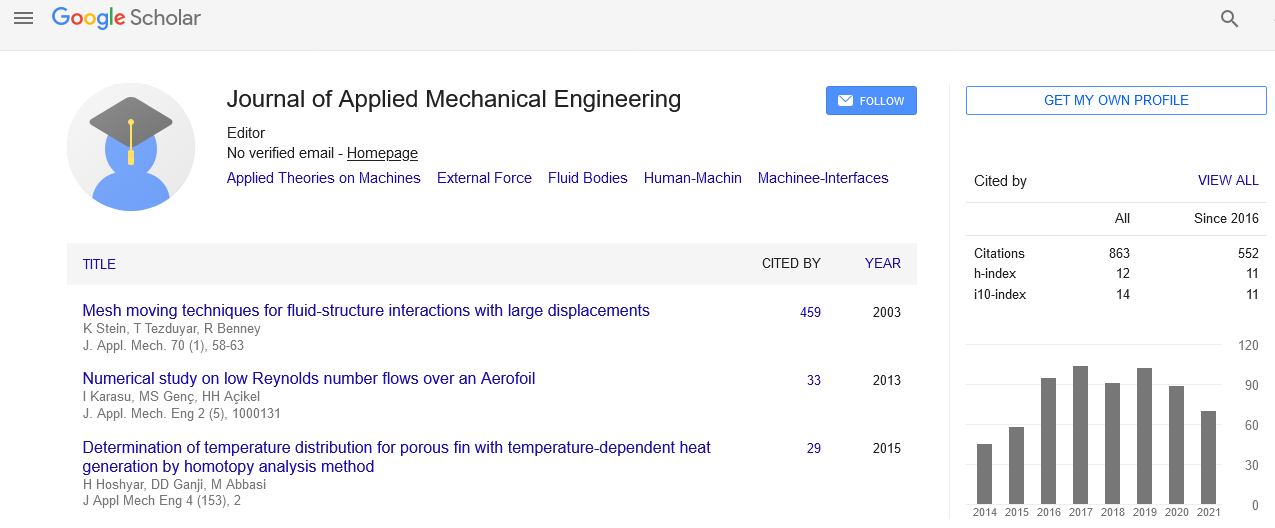Indexed In
- Genamics JournalSeek
- JournalTOCs
- CiteFactor
- RefSeek
- Hamdard University
- EBSCO A-Z
- OCLC- WorldCat
- Publons
- Google Scholar
Useful Links
Share This Page
Journal Flyer

Open Access Journals
- Agri and Aquaculture
- Biochemistry
- Bioinformatics & Systems Biology
- Business & Management
- Chemistry
- Clinical Sciences
- Engineering
- Food & Nutrition
- General Science
- Genetics & Molecular Biology
- Immunology & Microbiology
- Medical Sciences
- Neuroscience & Psychology
- Nursing & Health Care
- Pharmaceutical Sciences
New meshless formulations for aeroacoustics and compressible aerodynamic computations
2nd International Conference on Fluid Dynamics & Aerodynamics
October 19-20, 2017 | Rome, Italy
Xesus Nogueira and Luis Ramirez
Universidade da Coruña, Spain
Scientific Tracks Abstracts: J Appl Mech Eng
Abstract:
The development of numerical methods for the simulation of problems involving highly complex geometries, which are frequent in many engineering problems, remains a very active research field in computational fluid dynamics (CFD). In the simulation of turbulent flows, for example, high-accurate numerical techniques are required to account for the fine scales of the flow. In these kinds of problems, the construction of a good quality mesh is one of the most time-consuming procedures. Another example is Computational Aeroacoustics (CAA), where the low magnitude of acoustic waves and the wide range of frequencies involved, makes mandatory the use of very accurate numerical schemes. Nowadays, the standard numerical techniques in CAA are mainly grid-based methods. However, the use of Lagrangian methods in the context of CAA may be interesting for problems involving deformable or moving boundaries in the propagation media or multiphase flows, such as combustion noise, sound propagation through multiphase flows or bubble acoustics. Unfortunately, there are very few Lagrangian numerical methods to solve CAA problems in the literature. In this work, we propose a new high-accurate, stable and low- dissipative meshless method based on a Galerkin discretization of a set of conservation equations on an ALE approach, using moving least squares as weight functions for the Galerkin discretization. The stability of the scheme is achieved by the recent a posteriori multi-dimensional optimal order detection paradigm. We apply the numerical scheme to some test cases including CAA (Figure 1) and compressible flows. The proposed numerical method can be seen as a general formulation which includes some well-known meshfree methods. The promising results obtained shown that the proposed scheme can be applied to problems with engineering interest.
Biography :
Xesús Nogueira has his expertise in Computational Fluid Dynamics. He earned his PhD degree from University of A Coruña, Spain in 2009. He was Visiting Professor during the period 2011-2012 at Arts et Métiers ParisTech, France, and he is currently an Associate Professor in the Civil Engineering School at University of A Coruña. His research interests are focused on computational fluid mechanics, high-order methods for compressible and incompressible flows. He has received the Juan C Simo Young Investigator Award from SEMNI, the Spanish Society for Numerical Methods in Engineering.

